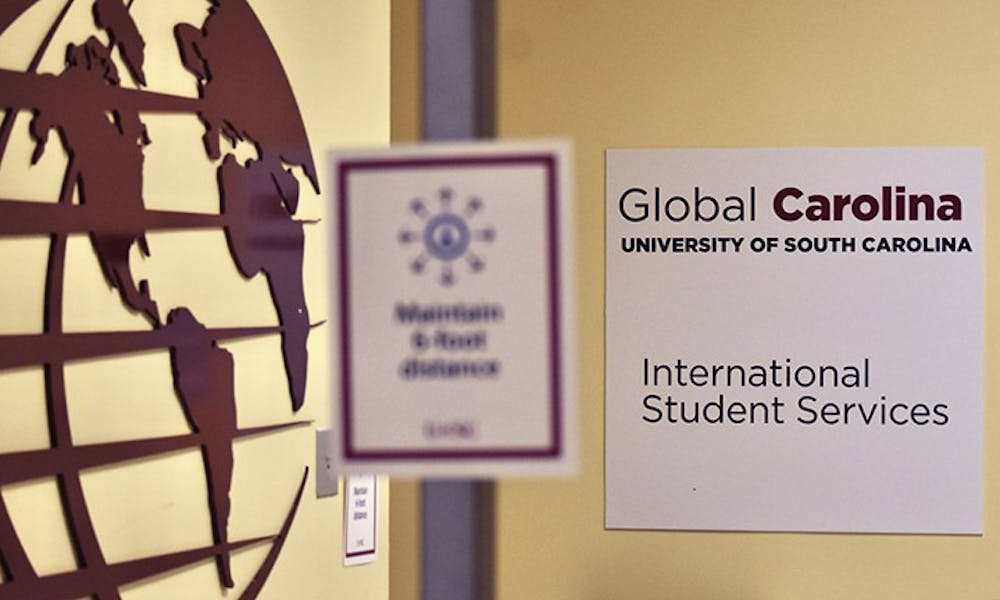The pandemic has made it more difficult for international students to obtain student visas and is giving them problems with travel and mental health as well.
International student enrollment at USC is down by about 20% this semester, which is due to travel restrictions, embassy and consulate closures, and students not wanting to travel during the pandemic, according to Lauren Smith, the director of International Student Services.
“As long as these travel delays and restrictions and issues are occurring, international students enrolling at the university is dependent on their ability to travel back and forth freely, and international and visa issuance just has been affected,” Smith said.
Smith said a 20% drop in international student enrollment is better than the decrease at other universities. There has also been an increase in the number of international students taking USC courses from home this semester, Beth Tilley, the incoming student coordinator for International Student Services, said.
The closure of consulates and embassies has made it difficult for incoming international students to obtain a student visa, but Tilley said these closures are due to bureaucratic problems surrounding the pandemic, not political ones.
“I know that there's a lot of political static at all times that is concerning to students, but some of these consulates just don't have a choice," Tilley said. "It's not like they are putting a cap on student visas. They're just not open.”
Most international students at USC are on the F-1 Visa. To renew the F-1 Visa, most students would have to travel back to a U.S. embassy or consulate in their home country. However, according to Smith, students can remain in the United States if their visa expires as long as they are pursuing a "full course of study" and meeting other requirements, which is called "duration of status."
A new Department of Homeland Security proposal would eliminate the "duration of status" protection and limit student visas to just four years, instead of allowing students to stay until they complete their studies. Sudipta Saha, a second-year mechanical engineering doctoral candidate and an international student, said this proposal and others will make circumstances more difficult for international students.
According to Saha, there is another proposal that would require international doctorate students to complete paperwork they already have to do within an earlier time frame than usual in order to extend their stay.
“For students who are pursuing a Ph.D. research, for that person, it is almost impossible to forecast at the second year of the degree if you require beyond four years or not. Frankly speaking, research doesn't work that way,” Saha said.
Most of the international students at USC are graduate students, and, according to Tilley, it’s important for them to be on campus while completing their research in order to gain funding, assistantships and a one-on-one experience with professors.
Tilley said student visas have always been an area of concern for international graduate students, but now more than ever, it is becoming a larger problem, affecting their studies and funding.
“These grad students, some of them quit their jobs, they changed their life, they were uprooting their family to move here, and, by not getting these visas, are hitting the snags and delays with their funding. If they can't start these assistantships, it's straining everything they have going on,” Tilley said.
Smith also said since it’s hard for international students to travel home, many of them are experiencing negative effects on their mental health.
“That does have a personal impact on these students because they may want to see their families or they have a family wedding to go to or they have a sick family member, whatever it may be, but there are reasons that students need to go home, and right now they have to really take a lot more into consideration before they make these travel decisions,” Smith said.
Ami Narushima, a fourth-year global studies student from Japan, is one of the many international students affected by travel restrictions, and, consequently, she will not be able to return home to see her friends and family over winter break.
“I want to go back home, but the Japanese government requires me to do two weeks quarantine,” Narushima said.
Narushima also said that not being able to meet other students in her classes has made her studies more difficult.
“For example, if I can’t understand what my professor said, I have no choice but to ask him directly because I don't have any contact with students in my classes,” Narushima said.
Saha and Narushima both said the pandemic has taken a toll on the mental health of current international students.
“Usually, international students are likely to feel isolated because of different culture and a different country, and then we left our families and our friends in our country, so even though we have friends here, sometimes we confront difficulties because of our incomplete English and different culture,” Narushima said.

